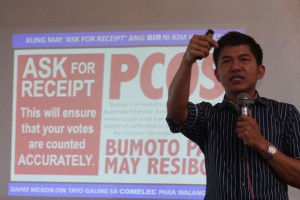THE Commission on Elections (Comelec) and technology provider Smarmatic-TIM Corp. are priming up the PCOS (Precinct Count Optical Scan) counting machines for cheating to favor administration candidates in the 2016 polls, according to a broad coalition group calling for credible elections.
The Reform Philippines Coalition (RPC) has demanded that the Comelec restore four major security features that, in the last 2010 and 2013 elections, it removed or effectively diluted, thus undermining the legitimacy, integrity and credibility of the Automated Election System (AES).
RPC is a broad coalition of Catholic Church members, lawyers and active and retired military, police and government officials, among others.
It counts among its supporters the Integrated Bar of the Philippines (IBP), the Philippine Constitutional Commission, Archbishop Oscar Cruz, former military chief Hermogenes Esperon, former senator Francisco Tatad, former Comelec Commissioner Manolo Gorospe and retired Admiral Damian Carlos.
In a three-page demand letter, the coalition asked Chairman Andres Bautista to order the return of the security features stipulated by Republic Act (RA) 939 or the Automated Election Law, particularly the ballot verification or ultra violet detectors, the source code review, the voter verified paper audit trail and the digital signature.
RPC spokesman Glenn Chong explained that without the four features, the 2016 elections would be an exercise in futility and would even be worse than the alleged fraud and manipulation committed in the 2010 and 2013 polls.
He pointed out that the general mode of cheating in 2010 was a combination of transmission cheating for national candidates and pre-loaded CF (compact flash) cards for local bets, while 2013 gave birth to the so-called “60-30-10” scheme wherein in 60 percent of senatorial slots went to the Liberal Party, 30 percent to United Nationalist Alliance and 10 percent to independent candidates.
“[The year] 2013 was a different matter. It was a malware inside the CF cards,” Chong said.
He further explained that the digital signature feature is intended to authenticate all transmitted election results and prevent the transmission of fake election results via authorized network intrusion or hacking, while the voter verified paper audit trail would assure the voter that his votes had been correctly read and counted by the voting machines.
The source code review, on the other hand, is intended to ensure the integrity and credibility of the AES by subjecting the source codes of the entire AES to independent review, testing and forensic examination.
The ballot verification is meant to prevent use of fake ballots and pre-loading of spurious votes into the CF (compact flash) cards.
According to Chong, the Comelec and Smartmatic have repeatedly refused to address said public concerns despite clear and uncontroverted evidence they have presented and the filing of numerous complaints before the Supreme Court (SC), the Joint Congressional Oversight Committee on the AES, the Department of Justice and the Office of the Ombudsman and the Philippine National Police by different civil society groups and personalities over the course of five years since 2010.
“With the coming 2016 elections, its legitimacy, integrity and credibility are again seriously threatened by the very same controversial removal and/or dilution of the AES security features and the very same flagrant violations of our election laws by those entrusted with [the elections’] conduct and management,” he said.
Greco Belgica, who also speaks for RPC, said they are giving the Comelec chairman 15 days to comply with their demand before implementing their next course of actions if nothing happens.
“We will be filing a mandamus case before the Supreme Court [if we get no favorable response from Chairman Bautista] to restore all the security features prescribed by law that were removed in 2010 and 2013 elections,” Belgica added.
Instead of filing another sabotage case, he said, they would follow up a similar case filed in 2010 before the Ombudsman by former senator Richard Gordon, and hold mass actions as well.
“Exactly 15 days after today, we will be gathering people to pray and demand, ask the Lord and chairman of Comelec to do what is right. We are not asking for illegal or drastic actions, in fact we are asking for something legal,” Belgica said.


